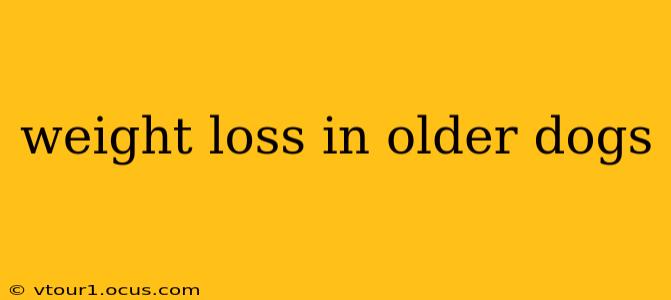Weight management is crucial for dogs of all ages, but it becomes especially important as our canine companions enter their senior years. Older dogs are more susceptible to various health problems exacerbated by excess weight, including arthritis, diabetes, and heart disease. Understanding the causes of weight gain in older dogs and implementing a safe and effective weight loss plan is vital for their health and longevity. This guide will address common concerns and provide practical strategies for helping your senior dog achieve a healthier weight.
Why is My Older Dog Gaining Weight?
Several factors contribute to weight gain in senior dogs. Understanding these underlying causes is the first step towards successful weight management.
-
Decreased Activity Level: As dogs age, they naturally become less active. Reduced playtime, shorter walks, and decreased overall mobility lead to a slower metabolism and fewer calories burned.
-
Hormonal Changes: Hormonal imbalances associated with aging can impact metabolism and appetite, leading to weight gain. Conditions like hypothyroidism can significantly affect weight.
-
Dietary Changes: Many owners unknowingly contribute to weight gain by altering their dog's diet. Switching to higher-calorie foods, increased treat frequency, or table scraps can quickly lead to excess weight.
-
Underlying Medical Conditions: Certain health issues, such as Cushing's disease or osteoarthritis, can cause increased appetite and weight gain. It's crucial to rule out any underlying medical conditions before embarking on a weight loss program.
-
Medications: Some medications can have weight gain as a side effect. Consult your veterinarian about potential medication-related weight gain.
What are the Dangers of Obesity in Senior Dogs?
Obesity puts significant strain on older dogs' bodies, increasing the risk of various health problems:
-
Arthritis: Excess weight puts extra pressure on joints, worsening arthritis pain and mobility issues.
-
Diabetes Mellitus: Obesity increases the risk of developing diabetes, a serious metabolic disorder.
-
Cardiovascular Disease: Weight gain strains the heart, increasing the risk of heart disease and related complications.
-
Respiratory Problems: Extra weight can make breathing more difficult, especially in brachycephalic breeds.
-
Incontinence: Obesity can exacerbate incontinence issues in older dogs.
How Can I Help My Older Dog Lose Weight Safely?
Weight loss in senior dogs requires a multi-faceted approach involving careful diet management, increased exercise, and veterinary supervision.
-
Consult Your Veterinarian: Before making any significant dietary or exercise changes, consult your veterinarian. They can perform a thorough examination, rule out any underlying medical conditions, and recommend a safe and appropriate weight loss plan tailored to your dog's specific needs and health status.
-
Gradual Dietary Changes: Sudden dietary changes can be stressful and even harmful to senior dogs. Gradually transition to a weight-loss diet formulated for senior dogs, ensuring it meets their nutritional requirements. These diets typically contain fewer calories and higher fiber to promote satiety.
-
Portion Control: Accurately measure your dog's food portions, strictly adhering to the veterinarian's recommendations. Avoid overfeeding, even with healthy foods.
-
Controlled Treats: Limit treats to a minimum. If using treats for training, opt for low-calorie options.
-
Increased Exercise: While avoiding strenuous activity that could aggravate existing conditions, encourage gentle exercise such as short walks, swimming (if appropriate), or playtime with interactive toys. Gradually increase the duration and intensity of exercise as your dog's fitness improves.
What if My Older Dog Doesn't Seem Interested in Exercise?
Many older dogs have decreased mobility or enthusiasm for exercise due to age or underlying health issues like arthritis. In these cases, focus on low-impact activities:
-
Short, Frequent Walks: Several short walks throughout the day are preferable to one long walk.
-
Hydrotherapy: Swimming is a low-impact exercise that can be beneficial for dogs with joint problems.
-
Passive Activities: Even gentle playtime indoors with interactive toys or puzzle feeders can help burn some calories and keep your dog mentally stimulated.
What Kind of Food is Best for Weight Loss in Older Dogs?
Veterinarians often recommend weight-management diets specifically formulated for senior dogs. These diets usually feature:
-
Reduced Calories: Lower calorie density to facilitate weight loss.
-
High Fiber: Increased fiber content to promote satiety and aid digestion.
-
Balanced Nutrients: Essential nutrients tailored to the needs of older dogs, despite the reduced calorie content.
Can I Give My Older Dog Supplements to Aid Weight Loss?
While some supplements might support overall health, there is no magic supplement for weight loss in dogs. Always consult your veterinarian before giving your dog any supplements, including those marketed for weight loss, to ensure their safety and efficacy. Incorrect supplementation can be harmful.
By following these guidelines and working closely with your veterinarian, you can help your older dog achieve and maintain a healthy weight, improving their quality of life and extending their lifespan. Remember patience and consistency are key! Weight loss takes time, and celebrating small victories along the way will keep you both motivated.
